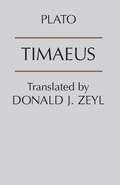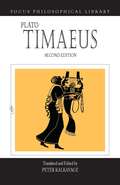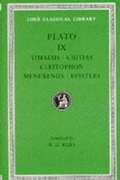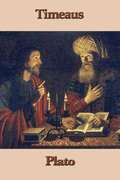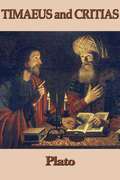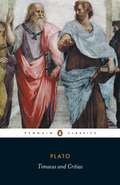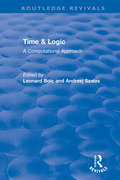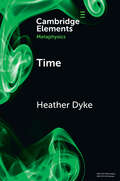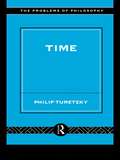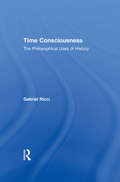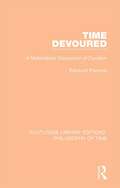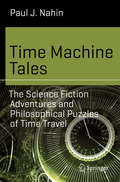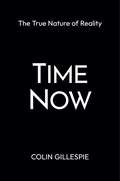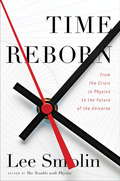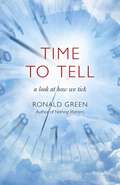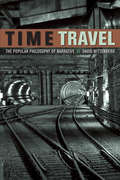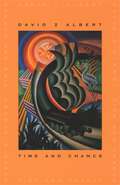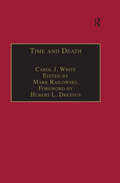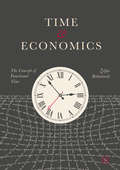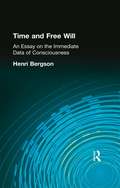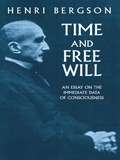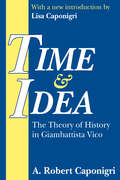- Table View
- List View
Timaeus
by Plato Donald J. ZeylFirst published in Plato: Complete Works, Donald J. Zeyl's masterful translation of Timaeus is presented along with his 75 page introductory essay, which discusses points of contemporary interest in the Timaeus, deals at length with long-standing and current issues of interpretation, and provides a consecutive commentary on the work as a whole. Includes an analytic table of contents and a select bibliography.
Timaeus
by Plato Peter KalkavageThis is an English translation of Plato's dialogue concerning speculation on the nature of the physical world and human beings. An extensive introduction provides careful insights to the reading of the work, the nature of Platonic dialogue and the cultural background of the Timaeus. Appendices on music, astronomy and geometry further provide guidance to the central thoughts of the dialogue. The glossary provides cross references and discussion for key words in the dialogue, functioning as springboards into the various concepts and ideas that are central to this and other Platonic dialogues and are useful starting points for any classroom discussion or personal thought.Focus Philosophical Library translations are close to and are non-interpretative of the original text, with the notes and a glossary intending to provide the reader with some sense of the terms and the concepts as they were understood by Plato's immediate audience.
Timaeus Critias Cleitophon Menexenus Epistles (Loeb Classical Library #234)
by Plato R. G. Bury<p>Plato, the great philosopher of Athens, was born in 427 BCE. In early manhood an admirer of Socrates, he later founded the famous school of philosophy in the grove Academus. Much else recorded of his life is uncertain; that he left Athens for a time after Socrates' execution is probable; that later he went to Cyrene, Egypt, and Sicily is possible; that he was wealthy is likely; that he was critical of 'advanced' democracy is obvious. He lived to be 80 years old. Linguistic tests including those of computer science still try to establish the order of his extant philosophical dialogues, written in splendid prose and revealing Socrates' mind fused with Plato's thought. <p>In Laches, Charmides, and Lysis, Socrates and others discuss separate ethical conceptions. Protagoras, Ion, and Meno discuss whether righteousness can be taught. In Gorgias, Socrates is estranged from his city's thought, and his fate is impending. The Apology (not a dialogue), Crito, Euthyphro, and the unforgettable Phaedo relate the trial and death of Socrates and propound the immortality of the soul. In the famous Symposium and Phaedrus, written when Socrates was still alive, we find the origin and meaning of love. Cratylus discusses the nature of language. The great masterpiece in ten books, the Republic, concerns righteousness (and involves education, equality of the sexes, the structure of society, and abolition of slavery). Of the six so-called dialectical dialogues Euthydemus deals with philosophy; metaphysical Parmenides is about general concepts and absolute being; Theaetetus reasons about the theory of knowledge. Of its sequels, Sophist deals with not-being; Politicus with good and bad statesmanship and governments; Philebus with what is good. The Timaeus seeks the origin of the visible universe out of abstract geometrical elements. The unfinished Critias treats of lost Atlantis. Unfinished also is Plato's last work of the twelve books of Laws (Socrates is absent from it), a critical discussion of principles of law which Plato thought the Greeks might accept.</p>
Timaeus and Critias
by PlatoTimaeus is a work of dramatic scope, presenting a view of the world as Plato knew it. Beginning with an account of the origins of the universe and ending with an exploration of human health and psychology, the book puts forward a coherent explanation of the physical and metaphysical realms and their connection with each other. As extraordinary as they may seem now, Plato's views were extremely influential, informing Western scientific thought up through the Middle Ages. Fascinating both for its divergence from a modern scientific theory and for the philosophical implications of its worldview, Timaeus is essential reading for anyone interested in the Ancient Greeks or the history of scientific thought.
Timaeus and Critias
by PlatoTimaeus, one of Plato's acknowledged masterpieces, is an attempt to construct the universe and explain its contents by means of as few axioms as possible. The result is a brilliant, bizarre, and surreal cosmos-- the product of the rational thinking of a creator god and his astral assistants, and of purely mechanistic causes based on the behaviour of the four elements. At times dazzlingly clear, at times intriguingly opaque, this was state-of-the-art science in the middle of the fourth century BC. The world is presented as a battlefield of forces that are unified only by the will of God, who had to do the best he could with recalcitrant building materials. The unfinished companion piece, Critias, is the foundational text for the story of Atlantis. It tells how a model society became corrupt, and how a lost race of Athenians defeated the aggression of the invading Atlanteans.
Timaeus and Critias
by PlatoTimaeus and Critias is a Socratic dialogue in two parts. A response to an account of an ideal state told by Socrates, it begins with Timaeus’s theoretical exposition of the cosmos and his story describing the creation of the universe, from its very beginning to the coming of man. Timaeus introduces the idea of a creator God and speculates on the structure and composition of the physical world. Critias, the second part of Plato’s dialogue, comprises an account of the rise and fall of Atlantis, an ancient, mighty and prosperous empire ruled by the descendents of Poseidon, which ultimately sank into the sea.
Time & Logic: A Computational Approach (Routledge Revivals)
by Leonard Bolc Andrzej Sza 322 AsOriginally published in 1995 Time and Logic examines understanding and application of temporal logic, presented in computational terms. The emphasis in the book is on presenting a broad range of approaches to computational applications. The techniques used will also be applicable in many cases to formalisms beyond temporal logic alone, and it is hoped that adaptation to many different logics of program will be facilitated. Throughout, the authors have kept implementation-orientated solutions in mind. The book begins with an introduction to the basic ideas of temporal logic. Successive chapters examine particular aspects of the temporal theoretical computing domain, relating their applications to familiar areas of research, such as stochastic process theory, automata theory, established proof systems, model checking, relational logic and classical predicate logic. This is an essential addition to the library of all theoretical computer scientists. It is an authoritative work which will meet the needs both of those familiar with the field and newcomers to it.
Time (Elements in Metaphysics)
by Heather DykePhilosophical thinking about time is characterised by tensions between competing conceptions. Different sources of evidence yield different conclusions about it. Common sense suggests there is an objective present, and that time is dynamic. Science recognises neither feature. This Element examines McTaggart's argument for the unreality of time, which epitomises this tension, showing how it gave rise to the A-theory/B-theory debate. Each theory is in tension with either ordinary or scientific thinking, so must accommodate the competing conception. Reconciling the A-theory with science does not look promising. Prospects look better for the B-theory's attempt to accommodate ordinary thinking about time.
Time (Problems of Philosophy)
by Phillip TuretzkyTime offers a comprehensive history of the philosophy of time in western philosophy from the Greeks through to the twentieth century.In the first half of the book, Philip Turetzky explores theories in ancient and modern philosophy chronologically: from Aristotle to Nietzsche. In the latter half, Turetzky describes the philosophy of time in three twentieth-century philosophical traditions:* analytic philosophy including philosophers such as McTaggart and Mellor* phenomenology Husserl and Heidegger* a distaff tradition which Turetzky identifies as including Bergson and Deleuze.
Time Alive: Celebrate Your Life Every Day
by Alexandra StoddardIn seven sections representing essential domains of life -- Time, Home, Style, Enthusiasm, Caring, Purpose, and Spirit -- Alexandra Stoddard shows us how to celebrate every moment of life. This treasury of brief essays is chock-full of the wise ideas, personal anecdotes, and practical strategies that have inspired millions of her readers and audiences to live more beautifully and meaningfully every day. She helps readers form their own personal philosophy for living as well as discover specific, small actions that build tranquil time into the most hectic day, add lightness and energy when needed most, elevate a passing moment into a vivid memory. She encourages readers to "take stock, and rethink everything. We need to make the connection between how we spend our time and how well we live our lives." With each essay offering a memorable mindset for living, Alexandra's observations are searching ("What is your deepest desire?"), surprising ("Lower your standards"), encouraging ("You have 8,766 hours a year to act wisely"), and whimsical ("You've gotta have a look") and are certain to spur readers to new levels of insight and joy.
Time Consciousness: The Philosophical Uses of History
by Gabriel R. RicciTraditional metaphysics is hostile to the world of the senses. From Plato to Kant, philosophers have demanded that the sensuous and corporeal aspects of existence be circumscribed by rational conditions and properties. Without these, the sensuous is unintelligible. This elevation of the ability to reason as quintessentially human has obscured efforts to acknowledge the pivotal role the historical imagination has in grounding experience. In The Philosophical Uses of History, Gabriel Ricci explores the opposite tendency, from Vico to Heidegger, to emphasize temporal and historical foundations of human consciousness.Ricci's goal is to demonstrate the reciprocity of history and philosophy. He challenges the epistemological construction of the subject-object relationship and the facile dualism originating from Descartes. Arguing that consciousness must be defined in time and space, he shows how Vico's philosophy of humanity, with its historical epistemology, resurrects the practical implications of ancient philosophy's demand that knowledge and truth derive from a productive process. Ricci analyzes Heidegger's philosophy as the modern embodiment of the temporality of consciousness, and he demonstrates the origins of his particular interpretation of human existence in Rickert's and Windelband's delineation of the historical and natural sciences.Ricci links their influence to Heidegger's dissent over Ranke's objectivist methodology, which ended with Heiddegger's emphasis of the historical character of human existence. Finally, the author argues for the compatibility of Heidegger's early existential analytic and his later investigation of poetry and his critique of the technological idiom which had colonized philosophy. In doing so, Ricci highlights the metaphoric and figurative predisposition of mind as synthetic functions of historical consciousness.In offering a thoroughly temporal interpretation of mind, Ricci illuminates the relationship between philosophy and history, poetry, the cognitive sciences, and the natural sciences. This work will be of interest to philosophers, literary scholars, and cultural historians.
Time Devoured: A Materialistic Discussion of Duration (Routledge Library Editions: Philosophy of Time #5)
by Edmund ParsonsOriginally published in 1964. This lively, challenging book, written with enthusiasm, conviction and clarity, sets out to elucidate the shadowy concept of Time. This involves central philosophical issues, which are vigorously discussed. Also relativity theory, in a clear-cut exposition, is made intelligible in a new light. All who are interested in science and its philosophical implications will find this book highly controversial but certainly readable.The author believes philosophy to be important, not only for its professionals, but for everyman. He believes that the fact that this is no longer realised shows that something is wrong with professional philosophy; he also indicates what this is. The book ends, surprisingly but pertinently, with a bold plunge into the questions of telepathy, precognition and psychical research generally. Whilst the phenomena are reasonably admitted, trenchant criticism of their significance confronts parapsychologists.
Time Machine Tales
by Paul J. NahinThis book contains a broad overview of time travel in science fiction, along with a detailed examination of the philosophical implications of time travel. The emphasis of this book is now on the philosophical and on science fiction, rather than on physics, as in the author's earlier books on the subject. In that spirit there are, for example, no Tech Notes filled with algebra, integrals, and differential equations, as there are in the first and second editions of TIME MACHINES. Writing about time travel is, today, a respectable business. It hasn't always been so. After all, time travel, prima facie, appears to violate a fundamental law of nature; every effect has a cause, with the cause occurring before the effect. Time travel to the past, however, seems to allow, indeed to demand, backwards causation, with an effect (the time traveler emerging into the past as he exits from his time machine) occurring before its cause (the time traveler pushing the start button on his machine's control panel to start his trip backward through time). Time Machine Tales includes new discussions of the advances by physicists and philosophers that have appeared since the publication of TIME MACHINES in 1999, examples of which are the chapters on time travel paradoxes. Those chapters have been brought up-to-date with the latest philosophical thinking on the paradoxes.
Time Now: The True Nature of Reality
by Colin GillespieTime Now will change the way you think about reality.Physicist and author Colin Gillespie brings together centuries of ancient thought and modern insights to unearth what is real and what is not. He tells the story of our universe from the very beginning, before the Big Bang, and reveals to us a whole new view of &“time.&” Gillespie writes with humor and gives deft explanations of complex concepts. He helps us find the inner truths about the universe and about ourselves. And he does it in a way that is accessible, inspiring, and entertaining.
Time Reborn
by Lee SmolinSince the ancients, physicists have argued that time is not real, that we may think we experience time passing but it's just a human illusion in a timeless universe operating on predetermined laws. Lee brilliantly shows how this thinking came about from our deep need for stability and the eternal, but that indeed time may be the only thing that is real.Since the ancients, physicists have argued that time is not real, that we may think we experience time passing but it's just a human illusion in a timeless universe operating on predetermined laws. Lee brilliantly shows how this thinking came about from our deep need for stability and the eternal, but that indeed time may be the only thing that is real.From the Hardcover edition.
Time To Tell: A Look At How We Tick
by Ronald GreenTime seems to flash by when we are enjoying ourselves, and slows to a crawl when we are bored. Why? Does time exist, or is it an illusion? Does it flow? Is it linear? How real are our memories? When is now? These are just some of the questions that Time To Tell asks in its foray into what time is for us, what it does to us and for us, and how we live and react to it in our daily lives. Digging down to the roots of our lived experience in the world, Time To Tell takes us through a journey replete with twists and turns and &“aha!&” moments. Challenging the obvious, the book asks us to look anew at our perspective of what we naturally take for granted. Rattling the comfort of instant satisfaction, of reality shows, celebrity worship and the self-glorification of the I-generation, Ronald Green, with panache and authority, takes us on a journey that allows us a new way of looking at ourselves in the world, and to act upon what we discover.
Time Travel Rabbit
by Momi DouglasThis book explores the notions that time travel, interspecies communication, and the connection of the individual to the whole are not only possible but real and definable, both in scientific and metaphysical terms. These concepts are revealed within an adventure story about two inhabitants of planet Earth, an elderly professor doing clandestine teleportation research, and a young mysterious rabbit who appears to be much more than he is. The information contained in this book originates with the author's actual life experiences and dream conversations with his rabbit friend, Mr. Pebbles. This book fulfills a promise to Mr. Pebbles to publish information about the true relationship between humans and their planet.
Time Travel: The Popular Philosophy of Narrative (Gothic Fantasy Ser.)
by David WittenbergThis book argues that time travel fiction is a narrative “laboratory,” a setting for thought experiments in which essential theoretical questions about storytelling—and, by extension, about the philosophy of temporality, history, and subjectivity—are represented in the form of literal devices and plots.Drawing on physics, philosophy, narrative theory, psychoanalysis, and film theory, the book links innovations in time travel fiction to specific shifts in the popularization of science, from evolutionary biology in the late 1800s, through relativity and quantum physics in the mid–20th century, to more recent “multiverse” cosmologies. Wittenberg shows how increasing awareness of new scientific models leads to surprising innovations in the literary “time machine,” which evolves from a “vehicle” used chiefly for sociopolitical commentary into a psychological and narratological device capable of exploring with great sophistication the temporal structure and significance of subjects, viewpoints, and historical events.The book covers work by well-known time travel writers such as H. G. Wells, Edward Bellamy, Robert Heinlein, Samuel Delany, and Harlan Ellison, as well as pulp fiction writers of the 1920s through the 1940s, popular and avant-garde postwar science fiction, television shows such as “The Twilight Zone” and “Star Trek,” andcurrent cinema. Literature, film, and TV are read alongside theoretical work ranging from Einstein, Schrödinger, and Stephen Hawking to Gérard Genette, David Lewis, and Gilles Deleuze. Wittenberg argues that even the most mainstream audiences of popular time travel fiction and cinema are vigorously engaged with many of the same questions about temporality, identity, and history that concern literary theorists, media and film scholars, and philosophers.
Time and Chance
by David Z AlbertThis study is an attempt to get to the root of the tension between the best scientific pictures of the physical structure of the world and the everyday, empirical experience of it. It examines the problem of the direction of time - the notion that whatever can happen, can happen backwards.
Time and Chance
by David Z. ALBERTThis book is an attempt to get to the bottom of an acute and perennial tension between our best scientific pictures of the fundamental physical structure of the world and our everyday empirical experience of it. The trouble is about the direction of time. The situation (very briefly) is that it is a consequence of almost every one of those fundamental scientific pictures--and that it is at the same time radically at odds with our common sense--that whatever can happen can just as naturally happen backwards. Albert provides an unprecedentedly clear, lively, and systematic new account--in the context of a Newtonian-Mechanical picture of the world--of the ultimate origins of the statistical regularities we see around us, of the temporal irreversibility of the Second Law of Thermodynamics, of the asymmetries in our epistemic access to the past and the future, and of our conviction that by acting now we can affect the future but not the past. Then, in the final section of the book, he generalizes the Newtonian picture to the quantum-mechanical case and (most interestingly) suggests a very deep potential connection between the problem of the direction of time and the quantum-mechanical measurement problem. The book aims to be both an original contribution to the present scientific and philosophical understanding of these matters at the most advanced level, and something in the nature of an elementary textbook on the subject accessible to interested high-school students. Table of Contents: Preface 1. Time-Reversal Invariance 2. Thermodynamics 3. Statistical Mechanics 4. The Reversibility Objections and the Past-Hypothesis 5. The Scope of Thermodynamics 6. The Asymmetries of Knowledge and Intervention 7. Quantum Mechanics Appendix: Gedankenexperiments with Heat Engines Index Reviews of this book: The foundations of statistical mechanisms are often presented in physics textbooks in a rather obscure and confused way. By challenging common ways of thinking about this subject, Time and Chance can do quite a lot to improve this situation.--Jean Bricmont, ScienceAlbert is perfecting a style of foundational analysis that is uniquely his own...It has a surgical precision...and it is ruthless with pretensions. The foundations of thermodynamics is a topic that has accumulated a good deal of dead wood; this is a fire that will burn and burn.--Simon W. Saunders, Oxford UniversityAs usual with Albert's work, the exposition is brisk and to the point, and exceptionally clear...The book will be an extremely valuable contribution to the literature on the subject of philosophical issues in thermodynamics and statistical mechanics, a literature which has been thin on the ground but is now growing as it deserves to.--Lawrence Sklar, University of Michigan
Time and Death: Heidegger's Analysis of Finitude (Intersections: Continental and Analytic Philosophy)
by Carol J. White edited by RalkowskiIn Time and Death Carol White articulates a vision of Martin Heidegger's work which grows out of a new understanding of what he was trying to address in his discussion of death. Acknowledging that the discussion of this issue in Heidegger's major work Being and Time is often far from clear, White presents a new interpretation of Heidegger which short-circuits many of the traditional criticisms. White claims that we are all in a better position to understand Heidegger's insights after fifty years because they have now become a part of the conventional wisdom of common opinion. His view shows up in accounts of knowledge in the physical sciences, in the assumptions of the social sciences, in art and film, even in popular culture in general, but does so in ways ignorant of their origins. Now that these insights have filtered down into the culture at large, we can make Heidegger intelligible in a way that perhaps he himself could not. White presents the best possible case for Heidegger, making him more intelligible to those people with a long acquaintance with his work, those with a long aversion to it and in particular to those just starting to pursue an interest in it. White places the problems with which Heidegger is dealing in the context of issues in contemporary Anglo-American philosophy, in order to better locate him for the more mainstream audience. The language and approach of the book is able to accommodate the novice but also offers much food for thought for the Heidegger scholar.
Time and Economics: The Concept of Functional Time
by Željko RohatinskiThis book links the philosophical perception of time and Einstein’s theory of special relativity to economic processes, showing that the phenomena of time dilation and length contraction seen in physics can be identified within – and adapted to – an economic framework. The author expands on Marx’s model of reproduction with the additional variable of time, which is represented as a relative or functional category. In addition to allowing a more precise understanding of both static and dynamic relations between economic systems, this concept examines approaches to time proposed by Smith, Marshall and Keynes, and challenges the equilibrium and disequilibrium economic models. Rohatinski suggests that by understanding the differences in economic activity perceived across different time periods we are better able to influence that activity at micro- and macroeconomic levels.
Time and Free Will: An Essay on the Immediate Data of Consciousness
by Bergson, HenriFirst published in 2002. Henri Louis Bergson was born in Paris, October 18, 1859. He entered the Ecole normale in 1878, and was admitted agrégé de philosophie in 1881 and docteur és lettres in 1889. After holding professorships in various provincial and Parisian lycées, he became maître de conférences at the Ecole normale supérieure in 1897, and since 1900 has been professor at the Collége de France. In 1901 he became a member of the Institute on his election to the Académie des Sciences morales et politiques.
Time and Free Will: An Essay on the Immediate Data of Consciousness
by Henri BergsonInternationally known and one of the most influential philosophers of his day (and for a time almost a cult figure in France, where his lectures drew huge crowds), Henri Bergson (1859-41) led a revolution in philosophical thought by rejecting traditional conceptual and abstract methods, and arguing that the intuition is deeper than the intellect. His speculations, especially about the nature of time, had a profound influence on many other philosophers, as well as on poets and novelists; they are said to have been the seed for À la recherce de temps perdu by Marcel Proust (whose cousin was Bergson's wife). Though his ideas were sometimes difficult to follow, Bergson was also a fine stylist, who once declared, "there is nothing in philosophy which could not be said in everyday language," and who was awarded the Nobel Prize for Literature in 1927.In Time and Free Will, written as his doctoral thesis, Bergson tries to dispel the arguments against free will. These arguments, he shows, come from a confusion of different ideas of time. Physicists and mathematicians conceive of time as a measurable construct much like the spatial dimensions. But in human experience, life is perceived as a continuous and unmeasurable flow rather than as a succession of marked-off states of consciousness — something that can be measured not quantitatively, but only qualitatively. And because human personalities express themselves in acts that cannot be predicted, Bergson declares free will to be an observable fact. Students and teachers of philosophy are sure to welcome this inexpensive reprint of Bergson's classic, influential essay, long a staple of college philosophy courses.
Time and Idea: The Theory of History in Giambattista Vico
by A. CaponigriLong a shadowy figure in the history of philosophy, it was only in the twentieth century that Giambattista Vico (1668-1744) achieved renown as a major and original thinker. There has been a steadily widening interest in this figure who, had he been known in his own day, might have altered the course of European thought. Much has been written in an attempt to clarify his historical stature, but in Time and Idea A. Robert Caponigri approaches Vico's thought in terms of its relevance to problems of modern philosophy. Viewing the essential problem of twentieth-century philosophy as the elimination of human subjectivity from nature, Caponigri shows how Vico offers us a principle for the vindication of our own spirituality through history.In Caponigri's reading, Vico establishes an absolute dichotomy between nature and history. The latter is seen as the sum of the active, fully realized human spirit and thus the context for the true understanding of human nature. Although Vico's major work, The New Science, incorporates vast amounts of concrete historical research and contruction, Caponigri's focus is on Vico's theoretical apparatus. Following an introductory biographical chapter, the author turns to Vico's theory of history, emphasizing its importance as a genuine philosophical undertaking rather than mere methodology. Caponigri shows how the speculative problem of history first presented itself to Vico in matters of jurisprudence and natural law from which he derived the concepts of time and idea as the terms in which the historical process of culture becomes comprehensible. He then introduces the human subject as the principle of the synthesis of time and idea, and discusses the Vichian concept of the "modification of the human mind," and his idea of "providence" as the rectifying principle of human history.First published in 1953, Time and Idea remains an essential contribution to the ongoing dialog on Vico's work.
